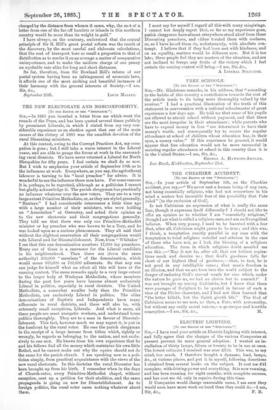THE NEW ELECTORATE AND NONCONFORMITY. [To THE EDITOR OF THE
" SPECTATOR." J SLR, In 1880 you inserted a letter from, me which went the rounds of the Press, and has been quoted several times publicly by prominent Liberals, in which I stated from my very con- siderable experience as an election agent that one of the main causes of the victory of 1880 was the unselfish devotion of the rural Dissenting ministers.
At this contest, owing to the Corrupt Practices Act, my occu- pation is gone ; but I still take a warm interest in the Liberal -cause, and am able to gauge the forces at work in the surround. ing rural districts. We have never returned a Liberal for North Shropshire for fifty years. I feel certain we shall do so now. But I wish to emphasize your article of September 19th as to the influences at work. Everywhere, as you say, the agricultural labourer is turning to his "local preacher" for advice. It is wonderful to see the influence these men have. For some reasons it is, perhaps, to be regretted, although as a politician I cannot but gladly acknowledge it. The parish clergyman has practically no influence whatever over the new voters. They are to a very large extent Primitive Methodists, or, as they are styled generally, " Ranters." I had considerable intercourse a little time ago with a large number of their ministers, who were holding an "Association" at Oswestry, and asked their opinion as to the new electorate and their congregations generally. They told me that there was only one Primitive-Methodist minister or lay preacher who was known to be a Tory, and he was looked upon as a curious phenomenon. They all said that without the slightest reservation all their congregations would vote Liberal and for Disestablishment. Now, from " Whitaker" I see that this one denomination numbers 17,000 lay preachers. Every one of these is a canvasser for the Liberal candidate in his neighbourhood. Then there are (from the same authority) 200,000 " members " of the denomination, which would mean 600,000 or 700,000 adherents. So that any one can judge for himself what an effect all this will have at the ensuing contest. The same remarks apply to a very large extent to the larger body of Wesleyan Methodists, whose members during the past few years have become almost exclusively Liberal in politics, especially in rural districts. The United Methodists, a somewhat smaller body than the Primitive Methodists, are exclusively Liberal in politics. The older denominations of Baptists and Independents have many adherents in rural districts, and these will also be, with extremely small exceptions, Liberals. And what is more, all these people are most energetic workers, and understand home politics thoroughly. They are to a man in favour of Disestab- lishment. This fact, however much we may regret it, is put in the forefront by the rural voter. He sees the parish clergyman in the receipt of a large income from tithes which, rightly or wrongly, he regards as belonging to the nation, and not exclu- sively to one sect. He knows from his own experience that he and his fellows find all the money which maintains his own little Bethel, and he cannot make out why the squire should not do the same for the parish church. I am speaking now as a poli- tician simply, from practical acquaintance with the views of the new rural electorate. In this doctrine the rural Dissenter has been brought up from his birth. I remember when in the days of Church-rates, every Primitive-Methodist chapel, without exception, sent up a petition for their abolition, and the same propaganda is going on now for Disestablishment. As to foreign politics, the rural voter cares nothing whatever about them.
I mast say for myself I regard all this with many misgivings. I cannot but deeply regret that, so far as my experience goes, parish clergymen have almost everywhere stood aloof from these Dissenting preachers, and either treated them with coolness, or, as I have heard them do, unfortunately, with absolute con- tempt. I believe that if they had been met with kindness, and on an equality, matters would be different now. But it is too late; these people feel they are masters of the situation, and are not inclined to forego any fruits of the victory which I feel certain the coming contest will bring.—I am, Sir, &c., A LIBERAL SOLICITOR.


































 Previous page
Previous page